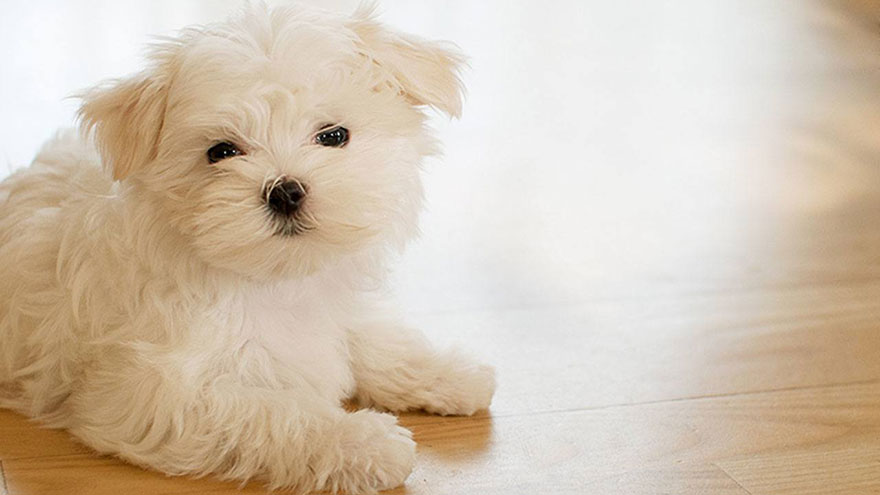Maltese : 10 Most Common Questions
The Maltese can be an excellent pet for those who live in an apartment or small home and will not have a lot of time or space for exercising their pet. In addition, this small breed makes a fine companion for family members, as well as a great pet for older folks who may not be able to handle a larger dog.
The Maltese is a naturally friendly breed, very protective of those it trusts. To help you understand this popular and beautiful dog, we have gathered ten common questions with answers to each.

1. What is the background/history of the Maltese?
The breed comes from the Mediterranean Sea area, most likely Italy and Greece, and gets its name from the island of Malta. This dog was known as the Roman Ladies’ Dog and the Melitaie Dog as well, although in the last 100 years, it has come to be known as the Maltese.
The breed’s history goes back hundreds of years, perhaps as far back as two or three thousand years. There is some evidence that the breed is tied to Asia and even to a small breed in the Swiss lake region.
2. How big does the Maltese get?
The American Kennel Club considers the Maltese a toy breed. An adult Maltese will normally weigh between 4 and 8 pounds. Some may weigh up to 10 pounds but most dog groups and associations consider this too large.
The body is sturdy, though small, and the well-groomed Maltese will appear a bit larger because of the wonderful white coat.
3. Are Maltese dogs too active for most families?
The Maltese is a naturally energetic breed that seems to be in motion a lot of the time. This breed enjoys physical activity, often running whenever it has the chance and the space to do so.
However, the young Maltese can be one of the easier dogs to train and will enjoy learning tricks and pleasing you, if you show some appreciation for good behavior. Getting a puppy from a good breeder will help channel your puppy’s energy in the right direction.
4. Is the Maltese a good dog for families with allergies?
The answer to this question is yes. The Maltese sheds very little because the coat is long hair rather than fur. This can be an excellent pet for those with allergies. In addition, those who are allergic to dogs in general may not have problems with the Maltese. This dog is one of the few breeds considered hypoallergenic.
5. Is the Maltese only an inside dog?
It would probably be best to plan to have your Maltese as an inside dog, because it can be sensitive to extremes in weather. This breed also does well with an occasional walk on a leash. However, the Maltese is an active, energetic animal, enjoying time to run around and even jump in puddles. Keep in mind the Maltese should never be left alone outside for long periods.
6. What is the best plan for housebreaking my Maltese?
Most owners with experience recommend paper training so that you will not have to make many trips outside in extreme weather conditions. The Maltese can be sensitive to extreme cold and extreme heat. Crate training can also be a good idea, to give your pet a place they will consider his own and will naturally keep clean.
7. Do Maltese get along with other dogs?
Generally, this breed well with other dogs, especially if well bred and socialized while young. A good breeder will help with this by spending time with young dogs to make sure each is well behaved, getting along with the other dogs at the breeder’s facility. However, some Maltese can be overly protective and very suspicious of animals they do not know. A new owner should always watch for this and make some effort at obedience training.
8. Is the Maltese a healthy breed?
Generally yes, though many small dogs have a tendency to such problems as luxating patella, in which the kneecap moves and can cause some pain and limited movement. Serious cases may require surgery. The Maltese is also prone to retinal atrophy, an eye condition that limits sight and can eventually lead to loss of vision.
Getting a puppy from a breeder who uses only healthy breeding parents can make a great deal of difference. Maltese may also have some problems with weak digestive systems, so you should consult with the breeder and your veterinarian for the proper diet for your pet.
9. How do I care for the long, white coat of the Maltese?
Daily combing and brushing will probably be necessary, but we recommend always using a gentle stroke. The coat is hair, not coarse fur and is actually very soft. Regular baths are probably a good idea, but the Maltese can be subject to chills, so make sure your pet is dry after the bath and keep him warm.
10. I have a young child. Will this be a problem?
The Maltese loves to be around children, but some very young children tend to treat this small dog as a toy, handling the pet too roughly. If you keep the child and the dog in sight at all times and supervise its activity, this should not be a problem.
However, starting with a puppy from a reputable breeder will be a key element in a well-behaved Maltese.
Read More About Maltese
- Maltese Breed Information
- Maltese Training Guide
- Maltese Health Guide
- Owning a Maltese : Breeder Recommendations


I have owned Maltese and desperately want another one but cannot find a puppy of quality for sale. Please help me locate one. I prefer a male. I live in Arkansas and do not want my puppy to have to travel a long distance on an airplane. I prefer to drive to pick it up. I am a senior citizen